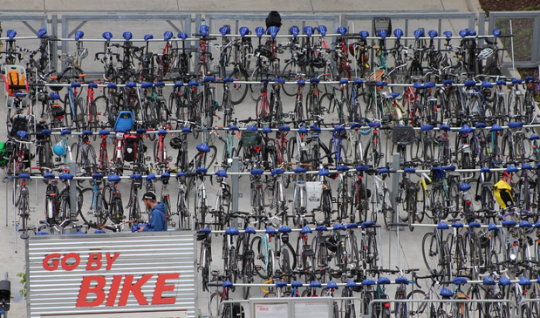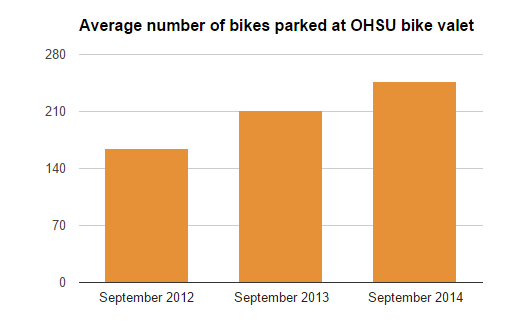
(Photo: Go By Bike)
Part of our series of guest posts, America’s Next Bicycle Capital, where we share community voices about the future of biking in Portland. This week’s guest writer is Kiel Johnson, owner of the Go By Bike shop and operator of the Go By Bike valet.
__
Repeat after me: it is not your fault your bike got stolen. Even if you were a dummy and left your custom bike unlocked only to return several hours later and find it stolen, it is not your fault.
The solution to ending bike theft is easy. It starts with this fact: we are already dealing as individuals with the costs of theft.
Most of us are accustomed to occasionally replacing a lost light, a stolen seat, and in many cases a whole bike. To truly solve bike theft, all we have to do is cover those costs as a society — in the form of secure bike parking.
The problem, in other words, is that we have not externalized the cost of secure bike parking.
We need to create secure bike parking that takes into account the realities of parking a bike. Everyone sometimes forgets their lock and it is impossible to theft proof all the components on a bicycle.
I am fortunate enough to work for a place that provides secure bike parking and has externalized these costs. At Oregon Health and Science University you don’t have to carry a clunky lock. Your lights remain on your bike and you don’t have to lug your bags and helmets around wherever you go. Over the past 2.5 years, people have parked their bike over 100,000 times at the bike valet I operate. Every single time, they got their bike back.
Having zero risk of your bike being stolen, as well as the social benefits and practicality of the bike valet, has created a huge spike in bike commuting to OHSU. After the first year, we had a 25 percent increase in valet users and after the second an increase of 35 percent.
The year before the bike valet opened, in the peak of summer, there were 202 bikes in the plaza around the tram. This past summer, with the addition of the bike valet, there were over 500.
At the risk of their own demise, anti-density activists and bike-unfriendly businesses are resisting a crucial fact: Car parking is expensive and bike parking is cheap. OHSU understands this. Even when you pay someone to watch over your bike, guaranteeing 100 percent security it is still much cheaper. In 2013, the Lloyd Center Mall paid $3,354,000 in property taxes for about 33 acres of central Portland, 16 of which are dedicated to car parking. Finding ways to get some of those people parking their bike instead of a car and transforming that space into retail would mean big money.
The bike theft problem is only going to get worse if we continue to ignore it. If you ride in Amsterdam you have a 13 percent chance of having your bike stolen every year. Here in North America, the most depressing fact about bike theft is that 7 percent of victims never replace their bikes.
Advertisement
What is the social cost of having those victims stop riding their bicycles? What is the cost of replacing over $2 million of reported stolen bikes in Portland, plus all the bikes that aren’t reported every year? Right now the victims and society are internalizing all these costs. If we know more bikes create value for society, we need to externalize those costs.
When I buy a bike, I should pay a small one-time registration fee, maybe $10 or $20, based on the estimated amount saved from bike thefts prevented the previous year.
One idea for how this could work comes from listening to what local gadfly Terry Parker has been saying for years. When I buy a bike, I should pay a small one-time registration fee, maybe $10 or $20. This fee would be based on the estimated amount saved from bike thefts prevented the previous year.
And I propose that when an individual buys a bike in Portland, the bike also comes registered. Registering bikes allows for police to flag used bikes as stolen prior to an individual buying it. The money from the fee would help pay for something that would benefit all bike users: a lot more secure bike parking. Here are some ideas of what could be incentivized:
- Bike parking with cameras and signs that state the presence of cameras
- Fenced bike parking
- Security guards or small bike valets at grocery stores and popular nightclubs
- Centrally located bike valets (like at transit hubs or big shopping centers)
- Bike checks to go alongside coat and bag checks with signs alerting people to what businesses provide this service
- An inexpensive long-term city bike loan fleet to reduce the incentive to steal a bike
None of this will happen if we keep blaming ourselves when our bikes get stolen. Bike theft is a huge problem and a massive deterrent against more people riding. Having fewer people riding bikes is bad for everyone.
We talk about safe street infrastructure like it is the only barrier to riding a bike, but it is not. And infrastructure is really expensive. To solve the social and practicality barriers that prevent people from riding a bicycle, we need to externalize the costs. A bike that is stolen and deters someone from riding more is not the fault of the rider, but of a society that has not taken into account the cost we all pay if that person takes their next trip in a car.
If you’d like to add your voice to this series, get in touch via email: michael@bikeportland.org.




